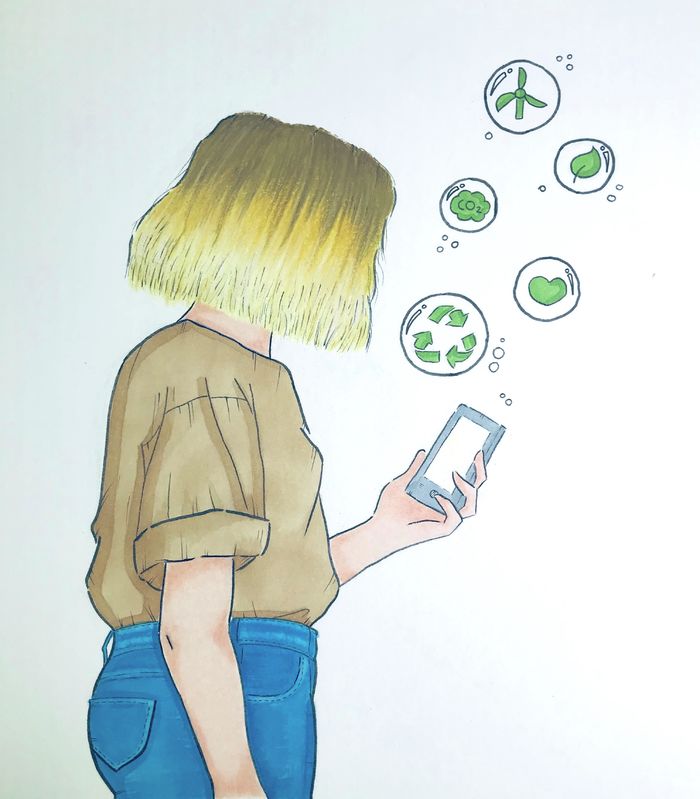Style Reimagined: Moving Towards Sustainability
Pilar Eche Fernandez looks at the recent emergence of sustainable business models in the fashion industry
2020 was a sudden stop. A stop in travelling, partying, socialising, and – let’s be honest – getting dressed. The Spring/Summer 2021 runway reflected a move towards comfort and openness in the form of wide-leg trousers and extra-wide denim, with firms like Acne and Hermès resorting to nets to open up the space to breathe at last. Not only that, but genderless clothing is on the rise, with designers like Nicolas Ghèsquiere advocating for a common ground between the traditional female and male dichotomy, exploring, as he explained in an interview with Vogue, a zone that ‘is highlighted by nonbinary people, people that are taking a lot of freedom dressing themselves as they want, and, in turn, giving a lot of freedom to all of us’. This focus on ‘freedom’ defines Ghèsquiere’s Spring Summer collection for Louis Vuitton, with shape-shifting garments to be worn in multiple and inclusive ways. His collection incites us to reconsider the clothes we buy, their potential to be styled imaginatively, and the possibility of borrowing and exchanging clothes with friends, no matter the gender.
“Your closet will become an exclusive space where only the clothes you truly love and feel comfortable in will be allowed.”
In fact, Ghèsquiere’s openness to new possibilities highlights the importance of using this time of uncertainty to redefine our relationship with fashion. As we slowly get up to open our wardrobe once again and shed our loungewear-skin, let’s pause and rethink our approach to buying and styling clothes. While the pandemic has taken over all news coverage, our environment is still in danger, and changing our consuming patterns is key to achieving sustainability goals. Citing the gallons of water needed to manufacture jeans and T-shirts has become a commonplace and possibly lost its impact. And, while we can applaud designers like Gabriela Hearst, whose Spring/Summer 2020 show was the first carbon-neutral fashion show, it is in our consuming patterns that meaningful action starts. Investing in basic pieces that can create infinite looks and be repurposed through layering, colour-blocking, or – a 2020 favourite – tie-dying, is key to constructing a wardrobe that can be accentuated by a few impulse buys and eccentric garments. In fact, this will potentially bring back the excitement to fashion; your closet will become an exclusive space where only the clothes you truly love and feel comfortable in will be allowed.
It is precisely this notion of building your style around unique and cherished pieces that lies at the foundation of Laagam. This Spanish firm is based on an on-demand business model, where a new product is launched every week and customers are given seven days to decide whether to order it or not. Only when you fall in love with a garment and place an order will manufacturing start, minimising the environmental cost. Not only that, but you can trace each product’s journey on their website, which tells you the who, the where, and how of manufacturing. Similarly, British brand Benjamin Fox sells on-demand products, handmade with sustainable fabrics and packaged with recycled and recyclable materials. The benefits of on-demand fashion are countless. Energy waste, material waste, and pollution are reduced at all stages of production and distribution.
In fact, sustainable business models in the fashion industry received new attention last year with the emergence of the 2020 Circular Fashion Pledge during Fashion Revolution Week. Brands committed to achieving at least one of three goals by the end of the year: enabling take-back or resale, increasing recycled content, or designing for durability. Similarly, the Make Fashion Circular initiative, launched in May 2017 at the Copenhagen Fashion Summit, reiterates on its website its commitment to sustainability in the industry, with a clear awareness that ‘to thrive, and not just survive, the fashion industry needs to radically redesign its operating model’. Firms such as Inditex, H&M Group and Stella McCartney are already partners in this initiative.
While it may seem difficult to take action as consumers, we have enough tools to get started. The Cradle to Cradle certification – which scores brands for their commitment to the circular economy – has launched the Good on You app, which allows you to discover ethical brands and to check the score of your favourites. With tools such as these we’ll be ready to dress for a – hopefully – soon-to-be post-pandemic world.
 Comment / Cambridge’s tourism risks commodifying students18 April 2025
Comment / Cambridge’s tourism risks commodifying students18 April 2025 News / Cambridge student numbers fall amid nationwide decline14 April 2025
News / Cambridge student numbers fall amid nationwide decline14 April 2025 News / Greenwich House occupiers miss deadline to respond to University legal action15 April 2025
News / Greenwich House occupiers miss deadline to respond to University legal action15 April 2025 Comment / The Cambridge workload prioritises quantity over quality 16 April 2025
Comment / The Cambridge workload prioritises quantity over quality 16 April 2025 News / Varsity ChatGPT survey17 April 2025
News / Varsity ChatGPT survey17 April 2025





